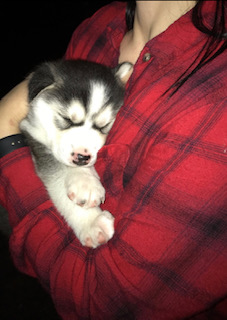
Are you thinking about a Siberian Husky for your first dog? I don’t blame you. Siberian Huskies are a beautiful and intelligent breed of dogs, full of character and talent. Is this too much of a challenge for a first-time dog owner? Let’s find out.
Adopting a Siberian husky as a first dog is not the recommended choice. Having a husky requires a lot of time and dedication to training. Owning a husky as a first-time pet is a challenge, and future owners should know what to expect before proceeding with the adoption.
Huskies are not the best choice for everyone. The husky breed is for experienced dog owners familiar with training, setting rules, and scheduling consistency. Don’t worry though. This doesn’t mean that you can’t adopt a dog or even a husky. Just review the responsibilities in this article before bringing home your new fur baby. Who knows? Maybe you are the perfect fit.
Disclaimer: The Can My Dog articles contain information based on the individual research and opinions of the author of the site – who just so happens to be a dog. How you utilize the information given is completely up to you. Proceed at your own risk.
A Siberian Husky as a First Dog
Having a Siberian husky requires a lot of attention and general responsibility. Although it is not recommended, it doesn’t mean it’s irresponsible or impossible for first-time dog-owners to adopt a Siberian Husky.
To adopt a Siberian Husky as a first dog, here are a few significant points to review:
Have Plenty of Time
Siberian huskies are a literally fur ball of energy. You will need plenty of time to hang out, play, run around, and stimulate your husky’s mind.
- Playtime and training are crucial
- Huskies need to be engaged almost constantly
Cold Climate
If you think about a husky’s general background, it makes sense that they are adapted to best survive in cooler to cold temperatures. Huskies have thick coats and are happy in cold temperatures. Nevertheless, a husky does love a good sunbathing session.
- Climate preference: Cold to 65°F is a husky’s “sweet spot”.
Shedding
Huskies have luscious fur which means, they shed their coat. Additionally, warmer climates mean more extensive shedding time. Huskies will shed a lot, usually during two different stages per year.
Pro tip: Get a robot vacuum to help you out.
We have one. We named him Grimes.
Exercise and Space
Again, Huskies have a lot of energy and need exercise. Whether they are engaged in a high-level activity or a room to run around in, they will need to expel their energy.
A few tips:
- Think about their natural habitat. They are also excellent dogs for sledding in the cold. They need to run. Jogging, playing, and swimming are excellent ways to utilize and harness their energy.
- Play fetch. Throw a stick, frisbee, toy, or balls for your husky to run and grab.
- Keep a vigorous exercise routine every day, generally 30 to 60 minutes a day.
- Don’t exercise in hot weather (65 and up is considered hot)
- Always have water and watch out for overheating . Play games at home or take him to a local doggy daycare center where he can play with friends in an indoor playground.
Mental Stimulation
Along with a husky’s high energy level, they also have high- intelligence. Huskies need to be mentally stimulated, or they will get bored.
Boredom means more disasters to clean up. You can easily find toys or snack dispensers that they can play with while you’re away at work.
- Kong toys
- Interactive Puzzle
- Hide and seek with snacks: You can always play a small hide and seek game with your husky. Hide some snacks on a couch or under a blanket, and they’ll have fun playing detective.
Escapism
Okay, not real philosophical escapism, but huskies love to escape, wander, and explore.
Husky Training
Training is essential for huskies, but it won’t be easy. They may generally be great in a class setting but not behave the same at home.
- Huskies are typically hard to train and need a firm alpha owner. Since Huskies are pack animals, they need to know who the alpha is.
- Check out crate training and obedience classes.
Unfortunately, huskies are commonly found homeless, injured, or brought to shelters because inexperienced and unaware owners are overwhelmed with their requirements.
PLEASE be sure you are ready to take on the load of responsibility.
Siberian Husky Caring Guide
Siberian huskies don’t eat as much as you think. For a 50-pound Husky, they will need 1200-1400 calories per day. As a pup and as an adult, spacing out food and making it fun for them is key.
When it comes to grooming, it’s the same for all dogs. Huskies will need regular bathing, nail trimming, and ear-cleaning. For huskies in specific, you will also need to do some “paw maintenance.” Although they shed everywhere, they don’t shed their fur on their paws. So, after playtime, it’s best to wash them off for sanitary reasons.
All pets need dental care. Brush their teeth regularly and give them dental snacks or toys. If you can’t brush their teeth every day, try to brush their teeth at least two times a week and visit your vet regularly. Your vet may also suggest a thorough dental cleaning once your husky is an adult.
The following are general traits that you will want to consider when adopting a husky:
| Difficult Husky Traits | Positive Husky Traits |
| Ill-bred dogs due to the popularity – puppy mills and backyard breeders are more common, and bad breeding leads to poor temperament and health | Generally mild-mannered |
| Difficult to train | Intelligent |
| “Escape artists”: loves wandering away and escaping home and leashes | Independent |
| Can be destructive | Non-aggressive, sweet, and gentle |
| Loves to dig | Friendly |
| Quick to boredom, needs to play, and be mentally and physically stimulated regularly | Adventurous, playful, and outgoing |
| Not a good guard dog | Quiet: does not bark often |
| High prey drive: will chase small cats, squirrels, and other animals especially when off leash | Great with children |
Tips For First Time Dog Parents
The following are general tips to help you become a successful first-time dog parents.
Dog-Proof Your Home
Whether it’s a pup or an adult husky, never leave out food or plants that dogs shouldn’t eat. Some pups will chew on your shoes, socks, walls, chairs, pencils, etc.
Continuously pick up after yourself too.
Prepare a nice bed for your dog to sleep in. This could be inside a crate or a nice warm bed. They need to establish a safe place, and if you’ve adopted a pup, a nice warm bed with a hot water bottle will help them feel the comfort of their dog mom.
Begin Training Your Puppy Immediately
You can always train an old dog new tricks, but the earlier the training, the faster they’ll learn.
This includes habits. If bad habits are starting to occur, make sure to cut the habit as soon as possible (eating food from the table, chewing on furniture, etc.)
Never hit your pets. I shouldn’t even have to write that sentence. Ever.
Hitting your pets during training or while disciplining will make everything harder. Guide them with voice and visual cues and always use positive reinforcements.
Grooming is Key
Always keep your dog well-groomed. Especially for long-haired dogs, their fur can become matted, which is painful for their skin.
Talk with your vet to keep your dog on appropriate diets for their specific age and breed.
Schedule Regular Vet Visits
This is crucial.
Your dog can’t speak like you, so they may not express pain in the most obvious of ways.
If your dog alters any of their routines or begins eating a little less, these are signs of discomfort. Schedule a vet appointment immediately.
Regular visits to the vet prevent undiagnosed diseases and keep them up to date on heartworm medications, flea and tick prevention, as well as their overall dental and general wellbeing.
Find a vet that will communicate well with you and one you can trust.
Patience and Routine
With routine, your dog will begin to behave as you teach.
Everything will take time, and it may be frustrating at first, but be patient. Your dog is in a whole new environment with complete strangers, give them time to adjust, and always offer your support and encouragement.
Dog Adoption
Whether it’s from a rescue shelter or a breeder, always keep in mind that you are providing a home for your husky.
You are adopting these animals to provide a family, warmth, love, and a forever home. Be responsible and be aware of all the sacrifices that will be required for your new fur baby.
Conclusion
Obviously you can adopt any dog or pet that you want. The most important thing to keep in mind is that you are adopting and bringing in a family member to take care of for the rest of their life.
This is the responsibility and mindset that you need to hold rather than worrying about the exact breed you want to adopt. All pets will need your attention, time, and affection regardless of breed.
And as always, continue to Live, Love, Laugh, and Scratch our bellies often.
Love you guys,
JTB
P.S. If you’re new to this world, you may want to check out my Ultimate Guide for First Time Dog Parents. It’s a great reference to get you started on this journey.
This article has been reviewed by our Editorial Board and has been approved for publication in accordance with our Editorial Policies.
